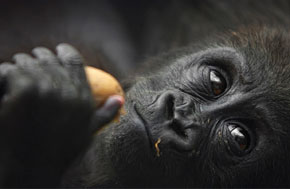 Wikipedia
WikipediaThe diet of gorillas cannot sustain both a large body and a big brain at the same timeWikipedia
Humans are the primates with the biggest brains and highest number of neurons, despite the fact that their bodies are not as big as a gorilla’s, for example. Why didn’t the evolution of the large simians also include an increase in the size of their brains? The answer may lie in a change of diet, posit neuroscientists Suzana Herculano-Houzel and Karina Fonseca-Azevedo, both of the Federal University of Rio de Janeiro (UFRJ). Knowing that the energy cost of a brain is in direct proportion to the its number of neurons, the researchers calculated the maximum number of neurons that 17 species of primates are capable of maintaining with the energy provided by a diet of raw foods (October 23, 2012 issue of PNAS). They discovered that the number of hours available to feed and the low caloric content of raw foods impose severe limits on the development of the body and brains of the animals. It is as if, throughout evolution, the species had to choose between gaining more body mass and increasing the number of neurons. A species like Homo sapiens would need to spend more than nine hours a day eating raw foods to develop and maintain a functioning brain. This obstacle is believed to have been overcome when our ancestor Homo erectus discovered fire. Cooked foods are easier to digest and provide more calories than raw food. With more energy and free time available for social activities, evolution would have favored the increase in the number of neurons.
Republish